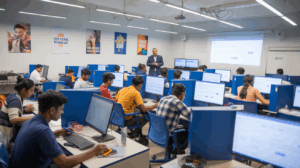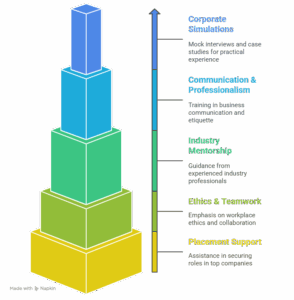In the evolving landscape of higher education, a campus training center plays a vital role in preparing students to meet industry demands and transition smoothly from academic life to professional careers. Especially for final year students, who are on the threshold of entering the workforce, these centers serve as the bridge between theoretical knowledge and practical skills, making them job-ready and competitive.
This article explores the significance of campus training centers, highlighting key programs such as campus training for final year students, student skill development, campus leadership training, internship training programs, and campus-to-corporate programs. We’ll also discuss how these initiatives contribute to holistic student development and enhance employability.
Campus Training Center Overview
A campus training center acts as a vital bridge between academic learning and industry expectations within educational institutions. These centers are dedicated to developing a well-rounded skill set in students by combining advanced technical training with essential soft skills such as communication, teamwork, and leadership. Through strategic partnerships with corporate trainers, industry experts, and experienced faculty, campus training centers offer a variety of learning formats—including hands-on workshops, industry-recognized certification courses, internships, and tailored placement support. This comprehensive approach ensures that students not only absorb theoretical knowledge but also gain practical experience, equipping them to thrive in today’s rapidly evolving professional environment.
At Upskill365, the campus training center model emphasizes this holistic development, preparing students to confidently meet the challenges of the competitive job market by aligning their learning journey with real-world demands.
Importance of Campus Training for Final Year Students
The final year represents a crucial transition, where students juggle intensive academic responsibilities alongside the urgent need to prepare for their careers. Campus training centers are instrumental during this phase, offering targeted programs designed to address the specific needs and challenges faced by graduating students. Key benefits include:
- Bridging Skill Gaps: By conducting thorough assessments and delivering customized training modules, campus training centers help students strengthen both their technical expertise—covering areas like programming, data analytics, and domain-specific tools—and soft skills such as effective communication, critical thinking, and emotional intelligence.
- Enhancing Career Clarity: Through exposure to industry trends, career pathways, and job market insights, students gain a clearer understanding of where their skills and interests align with opportunities.
- Boosting Confidence: Regular practice of interview techniques, group discussions, presentations, and leadership activities cultivates the confidence needed to impress potential employers and succeed in competitive selection processes.
- Expanding Professional Networks: Access to a wide network of industry professionals, alumni, and recruiters—facilitated through guest lectures, mentorship, and campus placement events—opens doors to valuable career prospects and guidance.
- Providing Practical Experience: Internships and live projects integrated into the training curriculum immerse students in real-world work scenarios, allowing them to apply classroom knowledge, adapt to workplace culture, and build an impressive portfolio of accomplishments.
By dedicating focused effort to these comprehensive training initiatives, final year students significantly enhance their employability while reducing the stress and uncertainty often associated with job searches. Programs like those offered by Upskill365 empower students with the structured support and industry-aligned skills necessary for a seamless, confident transition from academic life to professional success.
Student Skill Development: The Heart of Effective Campus Training
Student skill development is fundamental to preparing well-rounded professionals who can thrive in today’s competitive job market. It goes beyond theoretical knowledge, encompassing both hard technical skills and essential soft skills that foster holistic growth. Campus training centers play a pivotal role by offering comprehensive programs that nurture these abilities.
1. Technical Skills Training
Technical proficiency forms the backbone of any career in today’s digital world. Campus training programs tailor their offerings to students’ fields—be it engineering, management, arts, or sciences—by providing certifications and hands-on experience in in-demand technologies and tools. Key areas of focus include:
- Programming Languages: Master popular languages such as Java, Python, and C++ that form the foundation for software development and automation.
- Web Development: Gain expertise in front-end and back-end technologies like HTML, CSS, JavaScript, and modern frameworks such as the MERN stack to build dynamic websites and applications.
- Data Analysis and Visualization: Learn how to interpret complex data sets, generate insights, and create impactful visual reports using tools like Excel, Tableau, or Power BI.
- Cloud Computing and DevOps: Understand cloud platforms like AWS, Microsoft Azure, and Google Cloud, alongside DevOps practices that accelerate software delivery and improve infrastructure management.
- Digital Marketing and SEO: Explore strategies to enhance online presence, improve search engine rankings, and drive customer engagement through digital marketing.
- Financial Modeling and Analytics: For management and finance students, acquire skills in financial forecasting, budgeting, and data-driven decision-making.
This practical, certification-driven approach ensures students not only grasp theoretical concepts but also gain the hands-on experience demanded by employers.

2. Soft Skills Training
While technical expertise opens doors, it’s the soft skills that enable sustained career success and effective workplace collaboration. Campus training programs emphasize the development of interpersonal and leadership skills through targeted workshops and interactive sessions, covering:
- Effective Communication and Presentation Skills: Learn to articulate ideas clearly and confidently, whether in meetings, reports, or client interactions.
- Emotional Intelligence and Interpersonal Skills: Build self-awareness and empathy to navigate workplace relationships and manage conflicts constructively.
- Time Management and Goal Setting: Develop strategies to prioritize tasks, meet deadlines, and stay focused on career and personal growth objectives.
- Conflict Resolution and Negotiation: Equip yourself with techniques to handle disagreements professionally and reach mutually beneficial agreements.
- Critical Thinking and Creativity: Enhance problem-solving abilities and innovative thinking to adapt to changing challenges and contribute fresh ideas.
Campus Leadership Training: Grooming Tomorrow’s Leaders
In today’s competitive job market, leadership stands out as a defining quality that elevates candidates beyond their peers. Campus leadership training plays a vital role in nurturing these skills among students by:
- Promoting Active Participation: Encouraging involvement in student councils, clubs, and societies to develop teamwork, responsibility, and organizational skills.
- Conducting Leadership Workshops and Seminars: Offering structured programs that focus on critical leadership competencies such as decision-making, effective delegation, and motivating peers.
- Building Confidence: Enhancing public speaking abilities and event management skills to prepare students for leadership roles both inside and outside the campus environment.
- Instilling Ethical Leadership: Fostering a strong sense of integrity, accountability, and social responsibility, which are essential traits for impactful leadership.
Students who engage in campus leadership training not only position themselves for career success but also become positive contributors to their communities and future workplaces.

Internship Training Programs: Gaining Real-World Experience on Campus
Internships are invaluable in bridging the gap between academic knowledge and professional application, offering students firsthand industry exposure. However, many students lack the preparation needed to fully leverage these opportunities. Campus training centers fill this gap by providing comprehensive internship training programs that include:
- Tailored Resume and Cover Letter Writing: Crafting application documents that highlight relevant skills and experiences to stand out to internship recruiters.
- Focused Interview Preparation: Equipping students with strategies and practice for interviews specific to internship roles and industries.
- Workplace Etiquette and Professional Conduct: Teaching essential behaviors, communication styles, and expectations to help students thrive in corporate environments.
- Time and Project Management Skills: Training students to effectively balance internship responsibilities with academic and personal commitments.
- Skill Enhancement Workshops: Offering targeted training aligned with the demands of specific internships to maximize student readiness and impact.
These structured internship preparation programs empower students to secure meaningful internships that enhance their resumes, expand their professional networks, and provide a strong foundation for future career growth.
Campus-to-Corporate Programs: Ensuring a Smooth Transition from College to Career with Upskill365
The leap from academic life to the corporate world can often feel overwhelming for fresh graduates. Recognizing this critical phase, Upskill365 offers specialized campus-to-corporate programs designed to bridge this gap and prepare students to confidently embark on their professional journeys.
Key components of Upskill365’s approach include:
- Realistic Corporate Simulations: Students engage in mock interviews, group discussions, and case studies that closely replicate real workplace scenarios, helping them gain practical experience before entering the job market.
- Corporate Communication & Professionalism Training: Focused sessions on effective business communication, email etiquette, presentation skills, and professional behavior prepare students to navigate corporate environments with ease.
- Mentorship from Industry Experts: Upskill365 connects students with experienced professionals who provide personalized guidance, career advice, and insights into industry expectations.
- Ethics, Teamwork, and Organizational Culture: Programs emphasize the importance of workplace ethics, collaborative skills, and adapting to diverse corporate cultures, ensuring students are well-rounded and responsible professionals.
- Comprehensive Placement Support: From resume building and interview preparation to campus recruitment drives, Upskill365’s dedicated placement assistance helps students secure meaningful roles in top companies.
By integrating these elements, Upskill365’s campus-to-corporate programs significantly reduce the adjustment period for students transitioning into corporate roles. This holistic preparation enables graduates to confidently meet employer expectations and make impactful contributions from their very first day on the job.

How Upskill365 Campus Training Center Model Stands Out
Upskill365 is a pioneering leader in the field of skill development, offering a robust and comprehensive campus training center model tailored specifically for final-year students and early-career professionals. Recognizing the rapidly changing demands of the global job market, Upskill365 has designed a holistic approach that seamlessly integrates technical learning, soft skills enhancement, and real-world exposure. Here’s how their model distinguishes itself:
- Customized Training Modules Aligned with Industry Standards: Upskill365 develops training content that is carefully tailored to meet current industry trends and employer requirements. These modules cover a broad spectrum of in-demand technical skills—ranging from programming languages and data analysis to emerging technologies—ensuring students acquire the expertise that employers actively seek. Each program is designed with flexibility, allowing adjustments based on evolving market needs and feedback from corporate partners.
- Experienced Trainers and Guest Lecturers from Top Companies: Upskill365 brings onboard industry veterans, seasoned trainers, and guest lecturers from renowned companies, offering students direct access to expert knowledge and real-world insights. This collaboration bridges the gap between theoretical education and practical industry applications, providing students with an understanding of workplace culture, best practices, and current challenges faced by professionals.
- Blended Learning Formats for Greater Accessibility: Understanding the varied learning preferences of today’s students, Upskill365 offers a blended learning approach that combines the convenience of online classes with the effectiveness of face-to-face sessions. This flexible delivery model ensures learners can engage with content at their own pace while benefiting from interactive, instructor-led workshops, group discussions, and hands-on activities.
- Continuous Evaluation and Constructive Feedback: Progress tracking is a critical part of Upskill365’s training methodology. Through regular assessments, quizzes, practical assignments, and mock interviews, students receive timely and actionable feedback. This continuous loop of evaluation fosters a growth mindset, enabling learners to identify strengths, address weaknesses, and refine their skills throughout the program.
- Dedicated Placement Support and Industry Connections: Upskill365 goes beyond training by offering specialized placement assistance. From resume building and personalized interview coaching to organizing campus placement drives and networking events, students gain invaluable support in their job search journey. Strong ties with leading recruiters and companies help open doors to internships and full-time job opportunities.
- Focus on Holistic Development: In addition to technical prowess, Upskill365 places a strong emphasis on cultivating essential soft skills such as communication, leadership, teamwork, time management, and adaptability. This comprehensive development ensures that students are not only job-ready but also equipped to thrive in collaborative and dynamic work environments.
By combining these elements, Upskill365’s campus training center model transforms students into confident professionals prepared to face the challenges of the modern workplace. This integrative and forward-thinking approach sets Upskill365 apart as a leader in campus training solutions, empowering the next generation of talent to achieve lasting career success.
The Role of Technology in Modern Campus Training
Technology has fundamentally transformed the way campus training centers operate, making learning more accessible, engaging, and effective. Key technological innovations driving this transformation include:
- E-learning Platforms: These platforms offer students the flexibility to learn at their own pace and on their own schedule, breaking down geographical and time barriers while providing access to a vast array of resources.
- Virtual Labs and Simulations: Remote hands-on practice through virtual labs allows students to experiment and apply concepts in a controlled, risk-free environment, enhancing understanding without the constraints of physical infrastructure.
- AI-Driven Assessments: Artificial intelligence tailors learning experiences by analyzing student performance and customizing learning paths, ensuring personalized growth and efficient skill development.
- Interactive Webinars and Global Guest Lectures: Technology enables live interaction with industry experts and thought leaders from around the world, broadening students’ perspectives and connecting them to global knowledge networks.
- Collaboration Tools: Advanced communication and project management tools facilitate teamwork across campuses, fostering collaboration skills essential for today’s interconnected workplaces.
These technological advancements elevate both the accessibility and quality of campus training, creating a more dynamic, learner-centric environment that prepares students to meet modern workforce demands.
Benefits of Investing in Campus Training Centers
Educational institutions that prioritize and invest in well-equipped campus training centers experience significant and lasting advantages, including:
- Improved Placement Rates: Enhanced training programs lead to higher employment success, making institutions more attractive to prospective students and their families.
- Strengthened Reputation and Industry Partnerships: Demonstrated commitment to skill development fosters collaborations with leading companies, enhancing the institution’s brand and opening doors to exclusive opportunities.
- Increased Student Satisfaction and Alumni Success: Comprehensive training nurtures confident, job-ready graduates who contribute positively to their alma mater’s legacy through career achievements and referrals.
- Enhanced Industry-Academia Collaboration: Close ties with the corporate sector promote research, innovation, and curriculum relevance, ensuring education remains aligned with real-world needs.
- Creation of a Talent Pipeline: Campus training centers serve as vital incubators of skilled professionals, benefiting both students seeking meaningful careers and employers looking for qualified talent.
In today’s fast-evolving educational and professional landscape, campus training centers are indispensable, representing strategic investments that drive institutional excellence and student success.
FAQs
- What is the main purpose of Upskill365’s campus training center?
Upskill365’s campus training center aims to equip students with practical skills, industry knowledge, and soft skills needed to excel in their careers. - How do Upskill365’s campus training programs help final year students?
Upskill365 prepares final year students by addressing skill gaps, offering internship and placement training, and building confidence for job interviews. - What types of skills are developed in Upskill365’s student skill development programs?
Upskill365 covers both technical skills (like programming, data analysis) and soft skills (communication, leadership) to ensure holistic student development. - Why is Upskill365’s campus leadership training important?
Upskill365 nurtures leadership qualities that are critical for career advancement and personal growth, helping students become responsible future leaders. - How do Upskill365’s campus-to-corporate programs assist in job readiness?
Upskill365 simulates real workplace scenarios, teaches professional behavior, and provides mentoring to ensure smooth adaptation to corporate life.
Conclusion
A campus training center is an essential component of today’s education system, especially for final-year students preparing to enter a competitive job market. A well-structured campus training center offers targeted programs such as student skill development, leadership training, internship preparation, and campus-to-corporate initiatives that empower students to confidently transition into their careers.
The role of a campus training center goes beyond just skill building; it bridges the gap between academic knowledge and industry expectations. By investing in a comprehensive campus training center, educational institutions can enhance student employability and better prepare graduates for real-world challenges.
Ultimately, a strong campus training center acts as a strategic platform for both students and institutions, driving lifelong career success and professional growth.
A Campus Training Center plays a crucial role in creating a dynamic learning environment that adapts to evolving industry trends. By leveraging the resources and expertise available within the Campus Training Center, students receive continuous guidance and hands-on experience that foster both technical and soft skills. Moreover, a well-established Campus Training Center encourages collaboration between academia and industry, ensuring that training programs remain relevant and impactful for future professionals.

